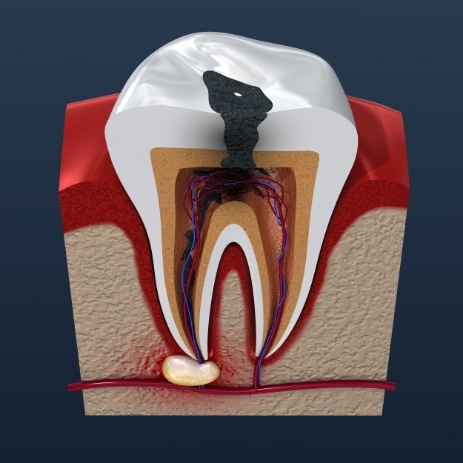Root canal therapy has a very high success rate, but nevertheless there’s always room for unexpected outcomes. Some decay might remain in overlooked areas of the tooth, or new decay might have occurred due to improper healing or a crown that was placed incorrectly. In these cases, you need to get in touch with Worcester Endodontics as soon as possible. We’ll address the problem with endodontic retreatment in Worcester, MA before the tooth is compromised, so it can continue to serve you well for years.
When is Endodontic Retreatment Needed?

We may recommend that endodontic retreatment be performed if we discover one of the following:
-
Extra or oddly shaped root canals that were not cleaned properly during the initial endodontic procedure.
-
The tooth wasn’t restored with a crown quickly enough, and bacteria were allowed to enter the tooth.
-
The remaining natural tooth structure has become cracked or fractured for any number of reasons.
-
A new infection has occurred and is causing the natural tooth to decay.
What’s the Endodontic Retreatment Procedure Like?

The first step to endodontic retreatment is to open the tooth again in order to access the inside of it. We’ll need to remove the restoration and filling material that were previously placed so that we can have access to the blocked root canals. A thorough cleaning is performed, with close attention being paid to parts of the tooth’s anatomy that might have been overlooked the first time. The tooth will be refilled at the end of the procedure, and a new filling will be placed as needed.
Endodontic Retreatment Aftercare

Once retreatment is complete and you’ve gotten feeling back in your mouth, you’ll probably experience some discomfort and tenderness. You can easily manage it with anti-inflammatory medication such as ibuprofen. We recommend rinsing your mouth with warm salt water three or four times a day to reduce risk of reinfection. You shouldn’t bite or chew with the affected side of the mouth for at least a few days. Call us immediately if the pain becomes severe or lasts longer than it should.
Endodontic Retreatment FAQs
Is Tooth Extraction Better Than Endodontic Retreatment?
You may be thinking that endodontic retreatment sounds like a hassle, and it might simply be cheaper and easier to have the problem tooth extracted, but this really isn’t true. Your natural teeth, when healthy, are always going to be the best option in terms of functionality, as well as concerning your long-term oral health. Plus, extracting that tooth means you’d inevitably have to replace it, which will lead to lengthy and costly treatment down the road. Ultimately, endodontic retreatment allows you to keep that natural tooth inside your mouth—which is a huge win.
How Long Does Endodontic Retreatment Take?
Recovery after endodontic retreatment is generally mild, with a manageable recovery period; many patients are pleasantly surprised by this! You can think of it as a more in-depth form of root canal treatment. Because the restoration and seal must be taken off and the entire tooth structure must be thoroughly examined and cleared out, you can expect this procedure to take more time than your first root canal. That said, the timeline will still vary based on the complexity of the issue. Make sure to block out plenty of time in your schedule to complete your treatment, including your recovery, which normally takes a few days. Our team is also happy to provide you with both a potential timeframe and a cost estimate once you schedule your appointment.
Does Endodontic Retreatment Always Happen Soon After the First Try?
No, this is not usually the case; in fact, root canals generally turn out positively for the patient in most cases, having a very high success rate in the short term. However, sometimes a tooth that was successfully treated with root canal therapy in the past eventually suffered additional damage or infection years later. Or in other words, you may have had a tooth fixed long ago with a root canal, and you’re now surprised to find that it’s suddenly bothering you once more. Over time, advancements in endodontic procedures have made it possible to save that tooth again!
Does Dental Insurance Cover Endodontic Retreatment?
Many dental insurance plans offer partial coverage for endodontic retreatment, but the exact benefits depend on your individual policy. Note that many plans pay for it just like they do for root canal treatment, which is generally around 50 percent of the total cost. However, be aware that some policies come with limitations. For example, if your tooth recently had a root canal, you may be responsible for the entire price of retreatment out of pocket. On the other hand, if the tooth was treated a while ago, it may be eligible for coverage again. We’re more than happy to walk you through all of the financial details before your treatment to ensure you don’t experience any surprises!




